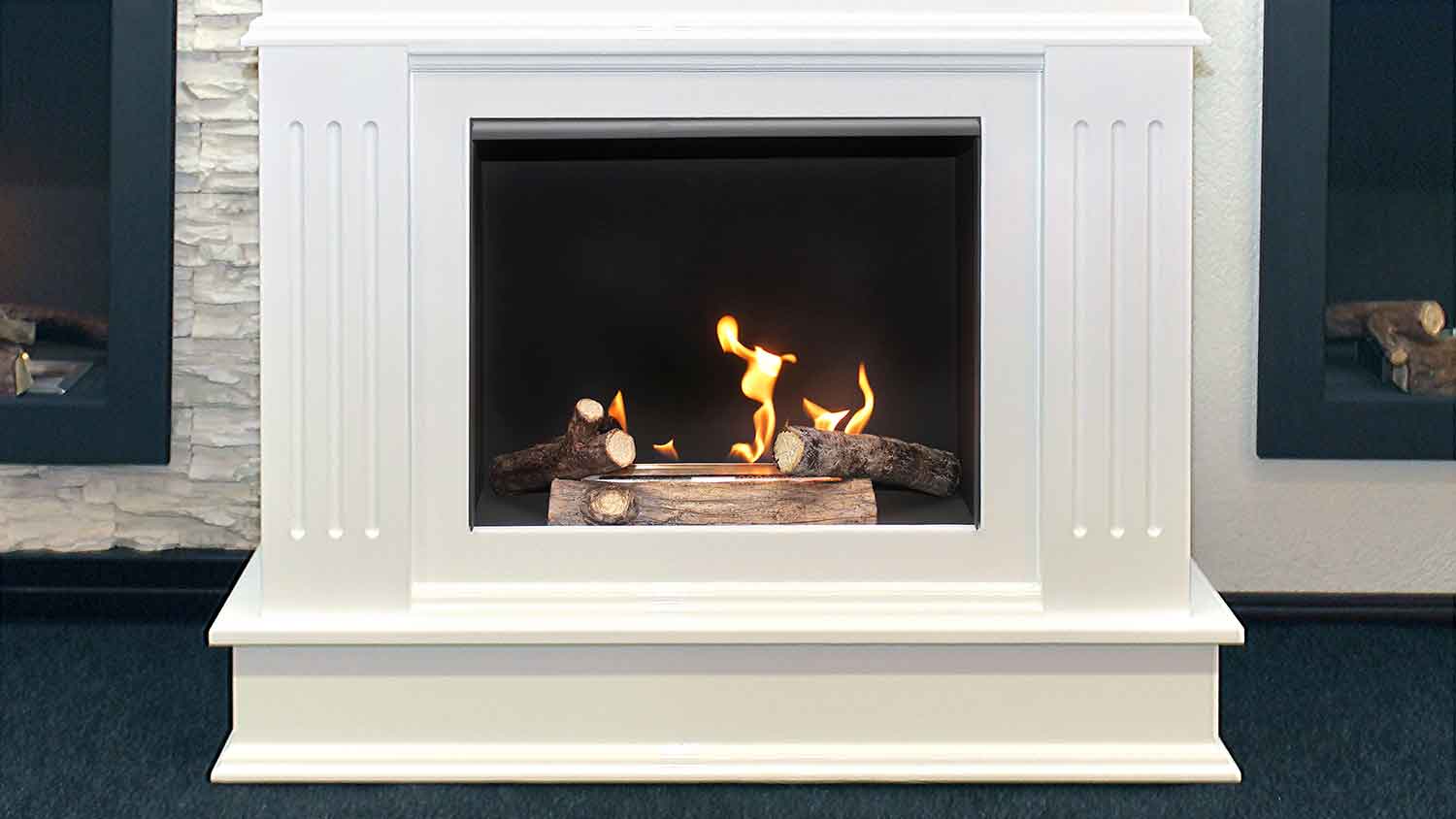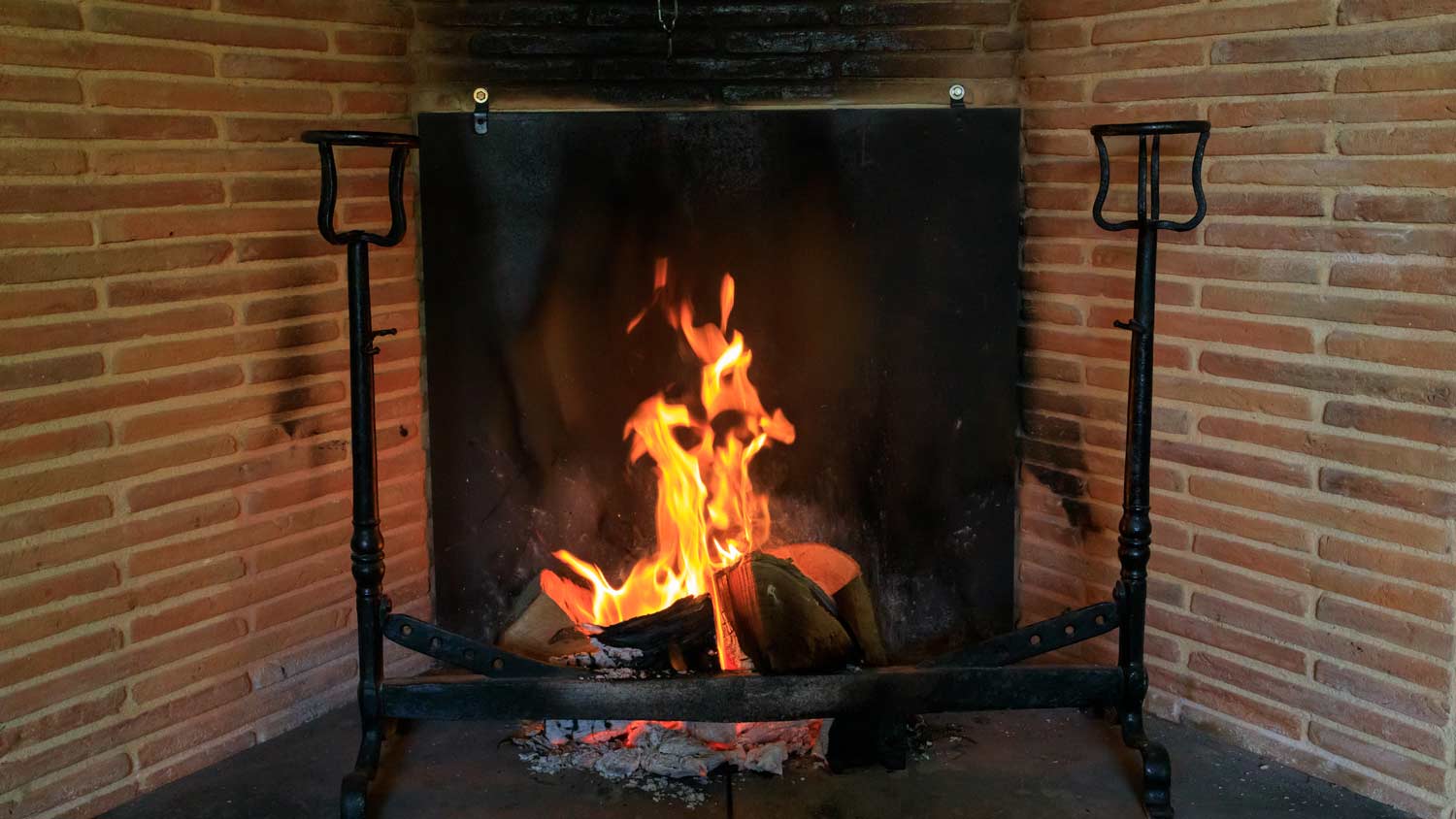How Much Does a Bioethanol Fireplace Cost? [2025 Data]
Installing a bioethanol fireplace costs between $700 and $1,400 on average, depending on the style and quality.


Does the sound of someone drilling a chimney and ventilation system into your home make you rethink your desire for the cozy ambiance of a fireplace? A bioethanol fireplace is an inexpensive alternative to traditional fireplaces that are also easy to install. A few more perks—they don’t need chimneys, and can keep your home soot-free. Here’s what to know about the cost of a bioethanol fireplace.
What Is a Bioethanol Fireplace?
Bioethanol-burning fireplaces are an eco-friendly alternative to more traditional fireplaces. These fireplaces are easy to install, require no chimney or ventilation system, and—unlike gas or wood-burning fireplaces—bioethanol-burning fireplaces use renewable fuel to keep your home warm.
Bioethanol is made from biomass that’s derived from plant materials like corn, wheat, sugar crops, and barley. This fuel, called denatured alcohol, is fermented into grain alcohol and mixed with ingredients that make it safe to be used around people.
The end product is a fuel that burns more cleanly than your conventional fireplace, though it might not make as much heat in comparison.
Average Cost to Install a Bioethanol Fireplace
Bioethanol fireplaces cost around $700 to $1,400 to install on average. The lowest cost for a bioethanol fireplace is a tabletop or burner insert, which has a starting cost of around $200 to $500. The highest cost for a bioethanol fireplace is a recessed fireplace, which costs upwards of $2,500 for the supplies alone. Labor to install one is an additional $175 to $325.
Compared to other fireplace insert costs, the bioethanol one falls on the lower end of the cost range.
Bioethanol Fireplace Installation Cost Compared to Other Fireplace Types

You’ll find that bioethanol fireplaces cost less to install than other fireplace options, since you don’t need a gas line installed or a ventilation system, but bioethanol fuel is costlier. Here are a few important differences between bioethanol fireplaces and other fireplace types.
| Fireplace Type | Average Cost |
|---|---|
| Bioethanol | $700–$1,400 |
| Gas | $2,300–$10,000 |
| Wood | $1,900–$3,800 |
| Electric | $100–$6,200 |
| Gel | $150–$3,000 |
Bioethanol vs. Gas Fireplaces
Remember, bioethanol fireplaces cost between $700 to $1,400 in total. Compare that to gas fireplaces, which can range from $2,300 to $10,000. The cost of ductwork, the gas line installation, chimney repair, and the materials alone make for a higher cost if you go for a gas fireplace.
However, natural gas is much less expensive than ethanol in terms of performance. According to the U.S. Department of Energy, natural gas costs around $2.33 per GGE (roughly one liquid gallon) and ethanol costs around $2.70 per gallon. On top of that, natural gas burns for longer—saving you money over time—and poses less of a fire risk than bioethanol.
Bioethanol vs. Wood Fireplaces
Wood-burning fireplaces cost approximately $1,900 to $3,800, which is more than twice the cost of a bioethanol fireplace on average. You’ll also need to pay for the wood. A cord of wood costs $300 on average and will last you around eight to 12 weeks.
Bioethanol vs. Electric Fireplaces
Electric fireplaces cost around $100 to $6,200 on average, making them costlier than bioethanol fireplaces as a whole. At the same time, electric fireplaces are also easy to install because they, like bioethanol fireplaces, don’t need ventilation or a chimney.
The downside to electric fireplaces is that their flames are artificial, which can affect that warm and cozy vibe you want in a living area. They also won’t run during a power outage, whereas bioethanol fireplaces will.
Bioethanol vs. Gel Fireplaces
A newer type of fireplace, gel fireplaces cost between $150 to $3,000 and don’t pose a spill risk. At the same time, you’ll end up paying more in the long run for a gel fireplace because gel fuel cans cost around $5 a can and only burn for around three hours per can.
How Much Does a Bioethanol Fireplace Cost by Type?
There are five types of bioethanol fireplaces that you can choose from for your installation. Here’s a look at the costs for the material only:
| Material | Cost |
|---|---|
| Tabletop bioethanol fireplace | $50–$500 |
| Wall-mounted bioethanol fireplace | $100–$2,000 |
| Bioethanol fireplace burner insert | $200–$500 |
| Freestanding bioethanol fireplace | $400–$1,200 |
| Recessed bioethanol fireplace | $900–$2,500 |
Table-Top Bioethanol Fireplace
A table-top bioethanol fireplace costs around $50 to $500 and sits on—you guessed it—a table. This fireplace type is perfect for both indoor and outdoor settings, although you might want to choose another option if you have pets or young children, since table-top fireplaces emit heat and can be bumped into by excited pets or touched by curious hands.
Another thing to keep in mind is table-top bioethanol fireplaces tend to be small (some are even portable), so if you’re hoping to keep a large space warm, you’ll want a larger fireplace.
Wall-Mounted Bioethanol Fireplace
Wall-mounted bioethanol fireplaces cost between $100 to $1,200. This option is ideal for small spaces that don’t already have a fireplace, as they take up less room and don’t require a recessed area or tabletop for mounting.
Bioethanol Fireplace Burner Insert
A bioethanol burner insert costs around $200 to $500 and fits into an existing fireplace. This option requires a fireplace for installation and is usually easy to install with a fireplace insert kit, which fits inside your old fireplace.
Freestanding Bioethanol Fireplace
Freestanding bioethanol fireplaces cost between $400 to $1,800. If your home has the space, a freestanding bioethanol fireplace has the presence to be a wonderful focal point for your living room.
Recessed Bioethanol Fireplace
Recessed bioethanol fireplaces cost between $900 to $2,500. Size, design, and upgrades play major roles in the drastic price range. For example, a stainless-steel fireplace with tempered glass, remote-controlled adjustment features, and in-depth dimensions will fall at the higher end of the price point.
Bioethanol Fireplace Cost Factors
Budgeting for a new fireplace starts at breaking down all the parts that could influence the cost of your project. Here are a few factors that do exactly that:
Fireplace dimensions: A fireplace with more depth and a longer length will cost more than a shallow fireplace.
Burner size: The burner size determines how much bioethanol can be added to your fireplace at a time, so more storage means a longer burn time.
Fireplace type: Table-top fireplaces cost significantly less than recessed fireplaces, so choose the fireplace type that best fits your budget.
Materials: Stainless steel fireplaces will cost hundreds more than other types of fireplace encasings.
Add-ons: An automatic or smart fireplace can operate with the touch of a smartphone. These fireplaces will cost more than a standard bioethanol fireplace, ranging from $500 to over $10,000.
Custom fireplace: A custom fireplace will have a higher starting price of $2,000 and can cost over $6,000 depending on the specifics.
Installation: If your fireplace requires a professional installer, add on $175 to $325 for the installation.
Installing a Bioethanol Fireplace DIY vs. Hiring a Pro
Most bioethanol fireplaces can be DIYed without the help of a local fireplace company. This is because you don’t need electricity, gas, vents, or a chimney. Most units can be purchased from your local hardware store and set up the same day, making sure to keep it away from flammable materials like curtains and furniture.
For a recessed unit, you may need a pro to install your fireplace, as these require experience with recessed walls. This will require a pro to install a fireproof wall around the unit and safely install it within the new opening.
Frequently Asked Questions
A liter of bioethanol costs $11 and burns for around four hours, making it cost around $2.75 per hour to keep your bioethanol fireplace running. For comparison, natural gas costs around $0.50 per hour, and propane costs around $1.60 per hour.
How much it costs you to run your bioethanol fireplace largely depends on how often you use it. Hypothetically speaking, if you run your fireplace for four hours a week year-round, you’ll go through one liter of biofuel per week or about $570 per year to run the fireplace.
A sneaky but important element to how long your new fireplace runs is choosing the right burner size. Avoid choosing a bioethanol fireplace with a small burner (less than two gallons) and opt for one that holds between two to four gallons for a longer burn time or else you’ll be stuck frequently refilling your fireplace.
Bioethanol fireplaces are safe when users follow the instructions and maintain the fireplace. Ethanol is flammable, however, and should be kept away from flammable surfaces, children, and pets.















